Making dispensaries with consumption lounges work cohesively as single businesses will be one of the more interesting challenges for the industry in the coming years. If product sales are the primary driver of revenue for a consumption lounge, this inevitably will eat into sales from the store. To square this circle, consumption lounge owners will need to be creative.
When it comes to creativity, one concept stands out: The Artist Tree. The dispensary chain’s West Hollywood, California, location—one of six in the state—is a three-story complex that places art and creativity at its core, partially treating its sales floor as an art gallery and its consumption lounge as an event space. Designed by architectural firm RDC and situated alongside other high-end dispensaries in WeHo’s so-called Emerald Village, the space has positioned itself as the cannabis shop for creatives in a major creative mecca, leaning into the concept to differentiate itself from increasingly stiff competition.
The complex on Santa Monica Boulevard operates under a stack of licenses, with a ground-floor dispensary to ensure all customers pass through the highest-volume sales location first. Upon entering, customers are met with a floor-to-ceiling glass cube illuminated with a violet hue and stocked with clones, which are available to purchase. A consumption lounge occupies the second floor, and another edibles-only consumption and event space resides on top.
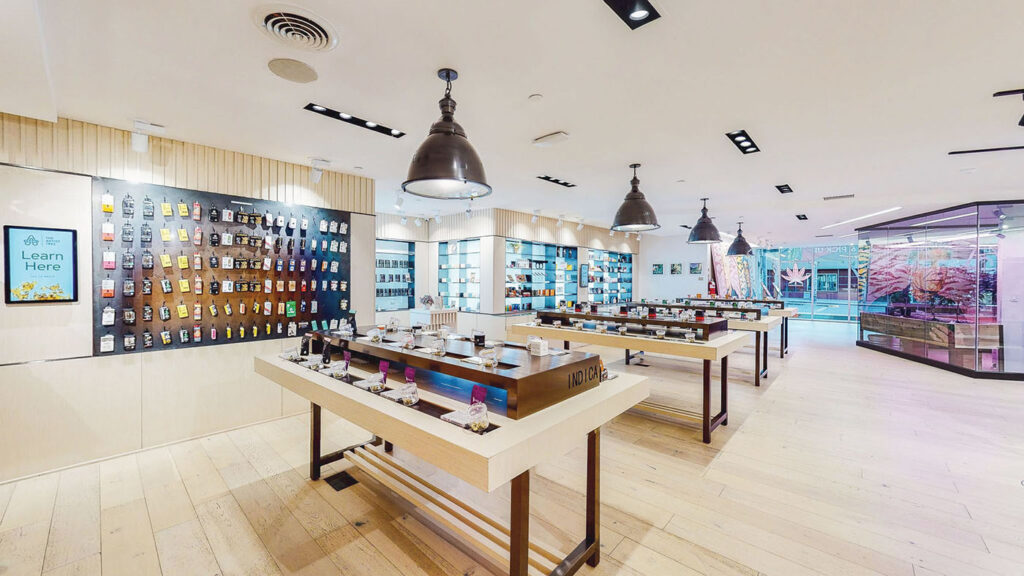
“People love the show grow” on the ground floor, said Patrick Mullarkey, manager at the WeHo location. “We have a budtender who also specializes in growing, so he’s on top of making sure the plants stay healthy and giving advice to consumers who are interested in buying them.”
From this first impression, it’s clear flower is king at The Artist Tree. Within the store, tables are packed with options from top to bottom shelf, running the gamut from indica to sativa. The menu boasts a strong portfolio of well-known California flower brands like Alien Labs, Maven Genetics, and Cannabiotix, all housed in novel jars that allow customers to pump air through them and smell the terpenes.
The store’s edibles selection stocks staples like Kiva, Wyld, and Cann in addition to a rotating cast of niche products including infused Keurig-type coffee pods, peanut butter, and sleek nano beverage enhancers from Alt. The latter partners with the store to operate a cannabis mocktail bar with live music in the consumption lounge upstairs.
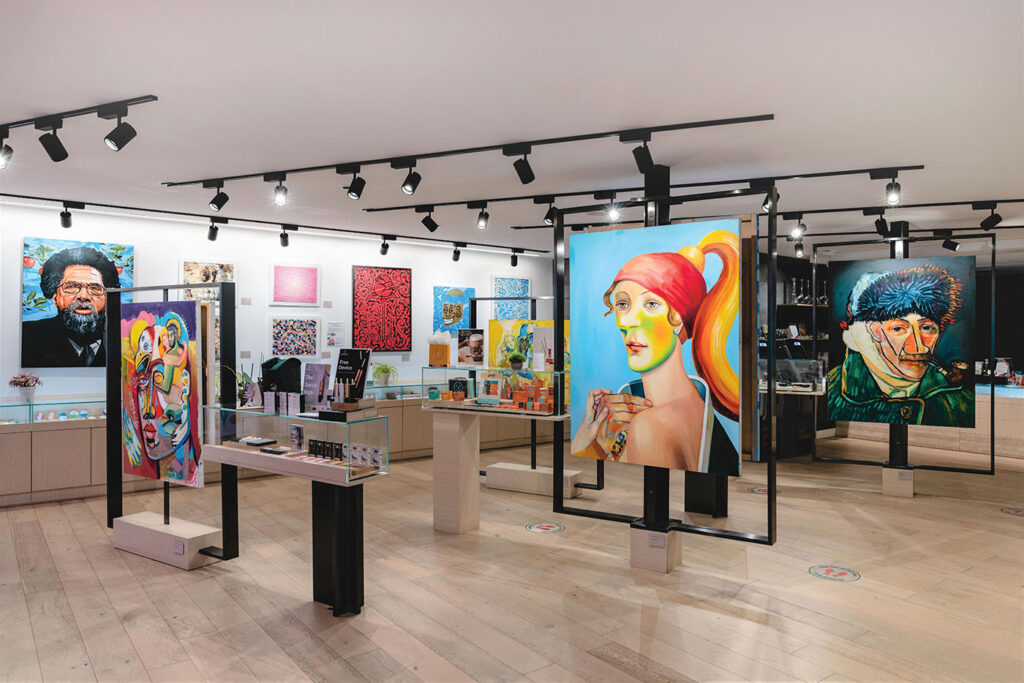
Throughout the shop floor, art from accomplished local creatives hangs from bespoke fixtures. All the art is for sale, and the dispensary doesn’t take a cut—unlike in traditional galleries, which can take as much as 50 percent of the proceeds as a commission. In The Artist Tree’s eyes, it’s just another experience enhancer that differentiates the stores and builds rapport with the community.
“Those are the things that will keep The Artist Tree alive whenever Amazon starts selling weed,” said Mullarkey. “It will give us a foothold and a significance to our community that will keep them coming here as opposed to just going to the cheapest.”
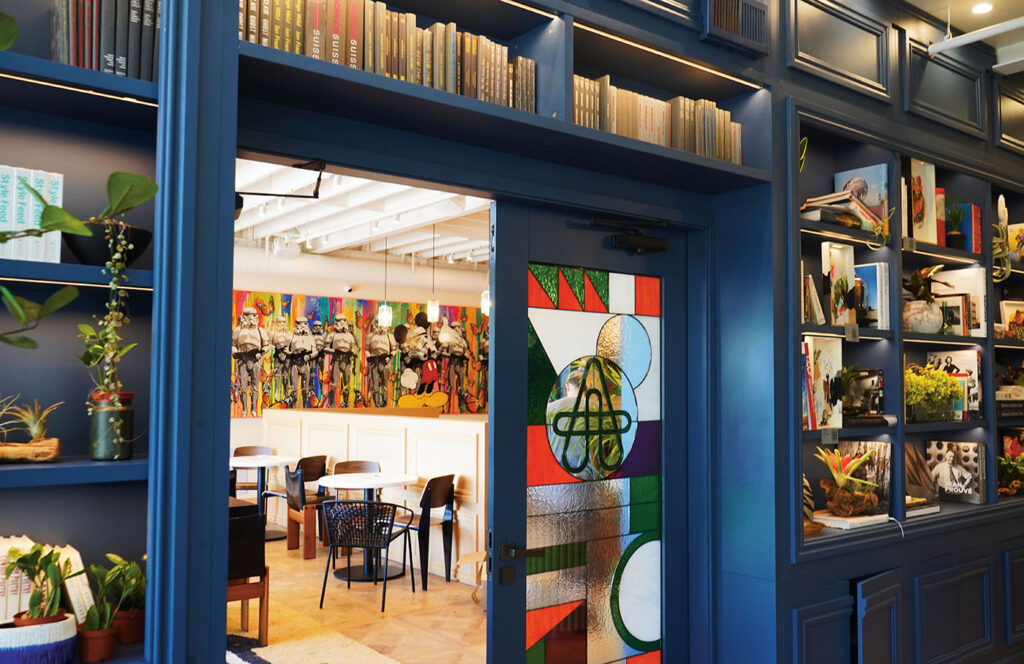
At the far end of the dispensary, a wall of faces painted by Jahlil Nzinga opens like a villain’s lair to a VIP sales room for high-rolling guests and special friends of the store.
Upstairs, the spacious, airy consumption lounge feels relaxed and clean. Its regal decor, color-coordinated bookshelves, and balcony seating make it a far cry from the heady, cavernous coffeeshops of Amsterdam. At the far end, customers can post up on stools at a long bar where they may rent bongs, dab rigs, and Stündenglass® Gravity Infusers (costs range from $15 to $40) or order coffee and macarons by Hervé or infused mocktails.
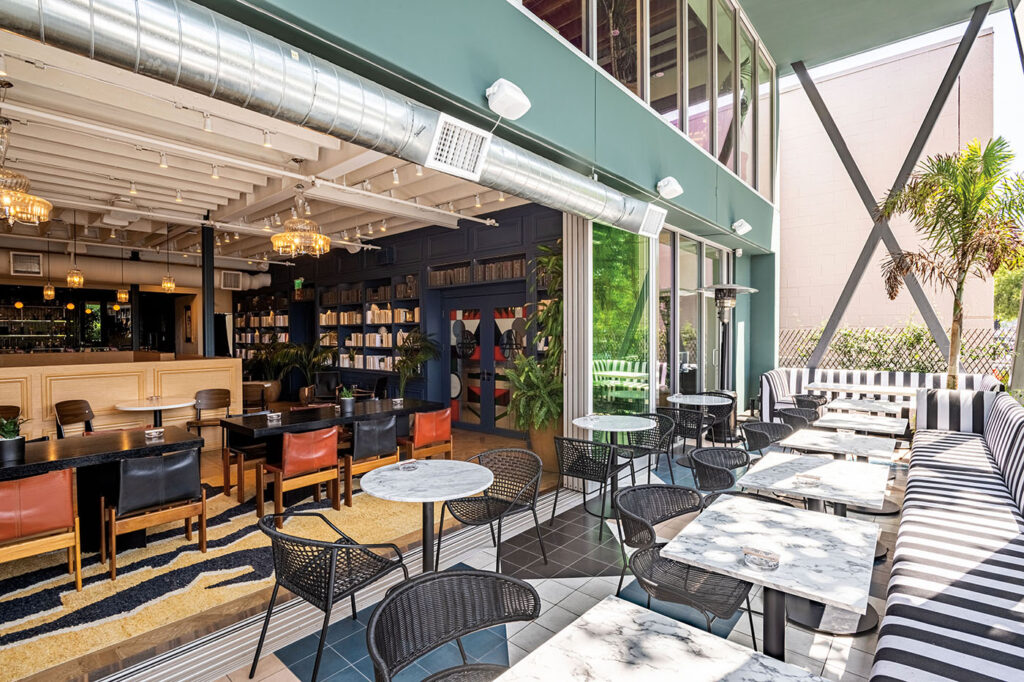
“We put a lot of time and effort into developing mocktails that taste extremely palatable and also give you a particular experience,” said Mullarkey.
Where the lounge comes into its own is with programming, particularly events with an admission fee. The Artist Tree hosts something almost every night of the week. Some are free; others are not. This opens up an important new source of revenue for the lounge beyond selling products.
If the dispensary and the lounge don’t compete to sell products, then tickets allow for a steady source of revenue without forcing the lounge to double as a restaurant, which is the bewildering route on which some other establishments are embarking. The Artist Tree’s event calendar is packed with stoned yoga, soundbaths, stand-up comedy, open mics, and drag brunches, all of which are well attended, brand-sponsored, and curated by a dedicated member of the staff. Mullarkey and his team see the event component as essential for spreading the word about the business.
“People tell their friends they saw a comedy show at the only place in LA where you can buy and smoke weed,” he said. “That kind of word-of-mouth marketing is invaluable, particularly in an area with a lot of competition.”
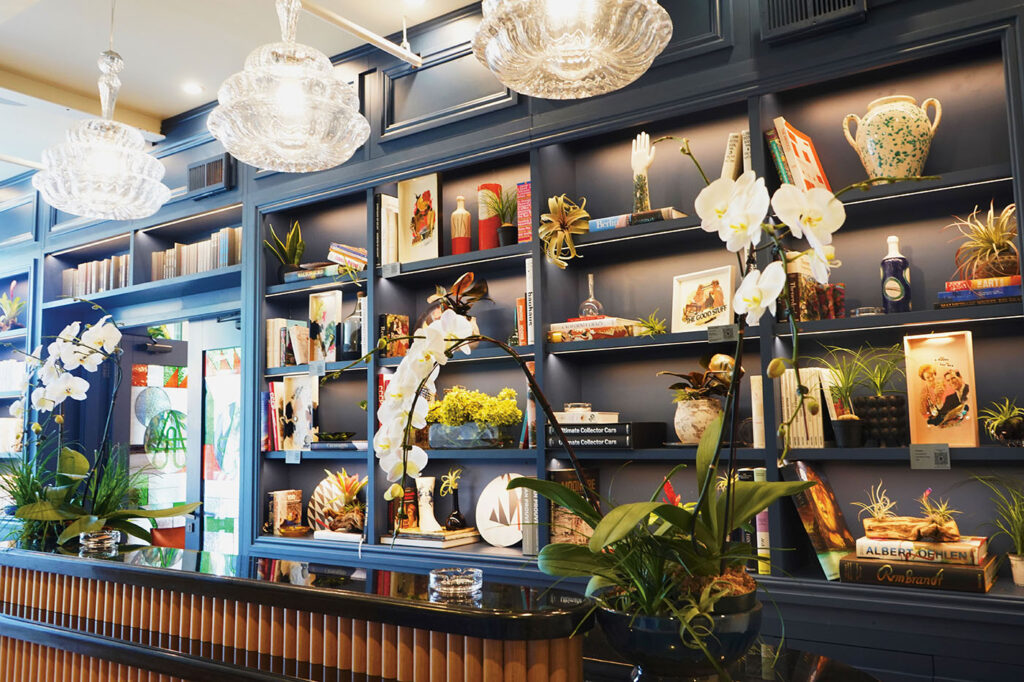
The top floor, also technically a consumption lounge, is reserved for special events and gallery showings. It even has a tabletop rosin press, allowing customers to purchase bud downstairs and make their own concentrates.
While the West Hollywood location might be the jewel in the chain’s crown, the company has a strong portfolio of stores in great locales. Locations include a gorgeous boutique in Beverly Hills, a store in Riverside, a shop amid landmarks in LA’s Koreatown, and one of only two operational dispensaries in Fresno, the largest city in California’s Central Valley.
In West Hollywood, the company has created an exciting blueprint for the successful marriage of retail and consumption in a neighborhood that caters to both locals and tourists. The management realizes creating a space for people to smoke their weed and leave isn’t really needed, wanted, or financially lucrative in a place like Los Angeles. But by adding an entertainment component, The Artist Tree has created a draw, established a new revenue stream, and sidestepped the sad fate many lounges suffer: emptiness.
“As soon as your space starts feeling empty, you’re going to start losing the repeat business you had,” warned Mullarkey. “Customers are not going to feel the energy or the vibe they want from that space. We want to make sure we’re always bringing something fresh to the table so people feel compelled to come back.”




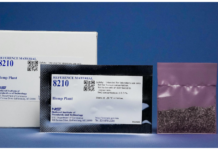

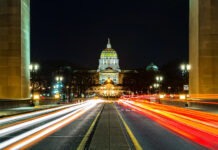
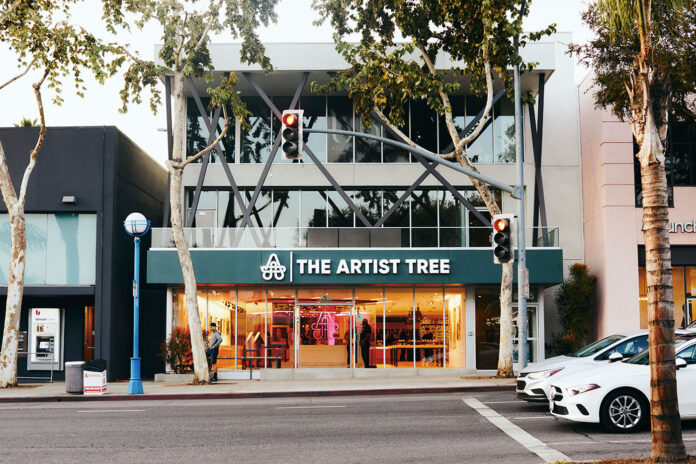
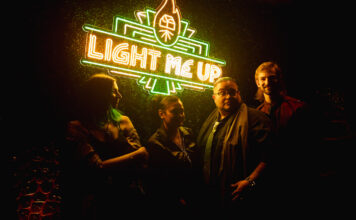

[…] why Fontein the employer is dedicated to providing opportunities for women to advance. Both she and The Artist Tree’s staff appreciate the voice surveys and focus groups that help Fontein understand the wants and […]
[…] The Artist Tree was granted one of the coveted consumption-lounge licenses in West Hollywood, California, because it was designed with art, culture, and creativity in mind. The store itself doubles as a gallery, showcasing and selling the work of local artists without taking a hanging fee. […]